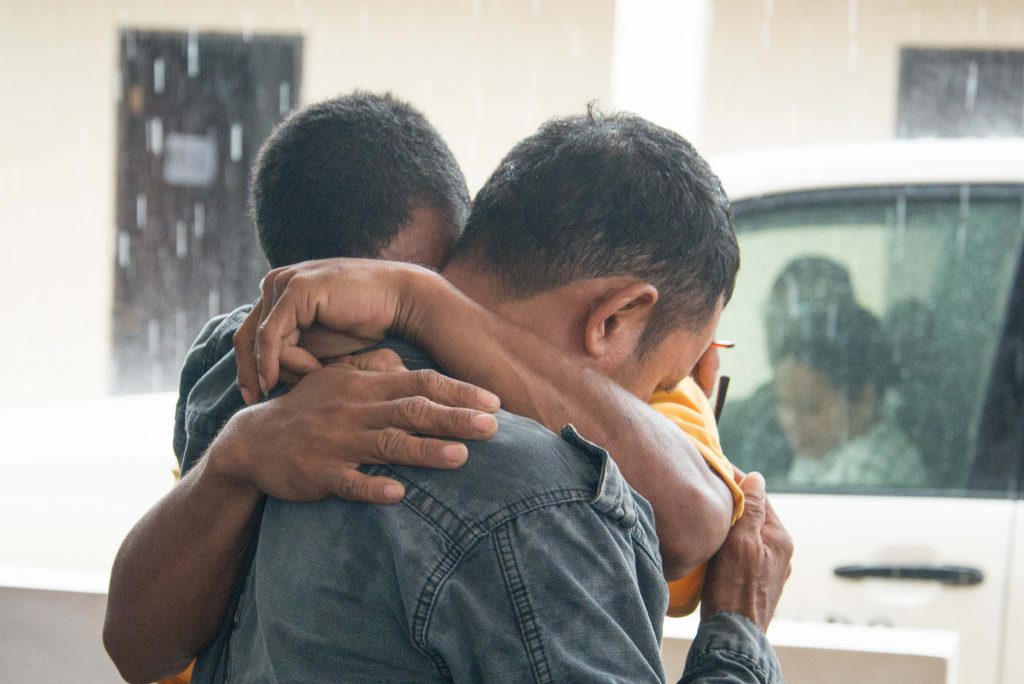Indonesia and Timor-Leste Must Do More to Search and Reunite the East Timor’s Stolen Children with their Families

Dili, Timor-Leste, 11 November 2019: “I feel very fortunate. I never thought I could return home after thirty-six years,” said Thiago Dos Reis Da Cunha during a meeting with the President of Timor Leste, Francisco Guterres. Thiago, together with 13 other “stolen children” (now adults living in Indonesia), are reunited with their families during a week-long visit on 11–18 November 2019. The President remarked, “With the cooperation of all related parties, this (reunion) has occurred several times before and must be continued… This program is a strong motivating force. I understand that finding each individual, one at a time, in various locations is very difficult.” President Francisco Guterres noted that these reunions “are a benchmark of democracy for bilateral relations between Indonesia and Timor-Leste.”
Hosted by Centro Nacional Chega! (CNC), the group also met with the Minister of Justice, Social Solidarity and the Indonesian Ambassador for Timor-Leste. During this occasion, Galuh Wandita, AJAR’s Director stated, “We appreciate the commitment of both governments supporting the reunion process. However, for true progress to be made, both governments must do more to find the thousands of survivors and to provide support after the reunions.”
Fourteen survivors living in North and South Sulawesi, Central Kalimantan, West Java and Jakarta were taken by soldiers and religious institutions between 1977- 1999. Of the 14 stolen children reunited this year, 3 are women, while the youngest was taken at the age of 6. They will be returning to their villages in Ainaro, Aileu, Baucau, Dili, Ermera, Lautem, Maliana, Manatuto, and Same.
Since 2013, Asia Justice and Rights (AJAR), together with a civil society-led working group spanning the two countries, has traced these individuals in Indonesia and helped to locate their families in Timor-Leste. More than 140 “children” have been found, and 66 have been reunited with their families. This initiative has been supported by the National Commission on Human Rights (Komnas HAM) and the Ministry of Foreign Affairs (Indonesia) as well as Centro Nacional Chega and the Ministry of Social Solidarity (Timor-Leste).
AJAR Timor-Leste’s Director, José Luis de Oliveira further stated, “We are taking this initiative based on the recommendations of Timor-Leste’s truth commission, CAVR, and the bilateral Commission for Truth and Friendship. Both countries share the obligation to do something to repair this past wrong.”
After the establishment of two separate truth and reconciliation commissions – the Commission for Reception, Truth and Reconciliation (CAVR) in 2001 and the bi-lateral Commission for Truth and Friendship (CTF, 2005-2008), part of the recommendation included that the governments of Indonesia and Timor-Leste take effective steps to find these children (now adults) and facilitate reunion with their families. In addition, the UN Working Group of Enforced Disappearances recommends strengthening current cooperation between both countries in implementing CTF recommendations, including building an accurate assessment of those who disappeared (UNWGEID, 2011). However, some initial strides have been taken to implement the recommendations, but there has been limited progress on the establishment of specific mechanisms to find the disappeared and separated children.
The reunification efforts to locate the children taken during the conflict in Timor-Leste has been conducted by the working group since 2015. The group is led by AJAR, working with the Commission for the Disappeared and Victims of Violence (KontraS) Jakarta, KontraS-Sulawesi, Association of the Families of the Disappeared in Indonesia (IKOHI), Legal Aid Institute (LBH) Bandung, One Justice Foundation (YSK), survivor’s association (Labarik Lakon) in Sulawesi, West Java, and Jakarta in Indonesia. In Timor-Leste, members include Asosiasaun Chega Ba Ita (ACbit), Asosiasaun HAK, Timor-Leste Red Cross (CVTL), and the International Committee of the Red Cross in Timor-Leste (ICRC-TL). The Working Group works closely with Indonesia’s National Commission for Human Rights (Komnas HAM), Timor-Leste’s Ombudsman for Human Rights and Justice for Timor-Leste (PDHJ), Centro Nacional Chega (CNC); and is supported by the International Committee of the Red Cross, Ministry of Foreign Affair of Indonesia.
Contact Persons:
- José Luís de Oliveira, AJAR Timor-Leste Program Director, +670 7723 7170
- Galuh Wandita, AJAR Director, +62 813 8276 1997
